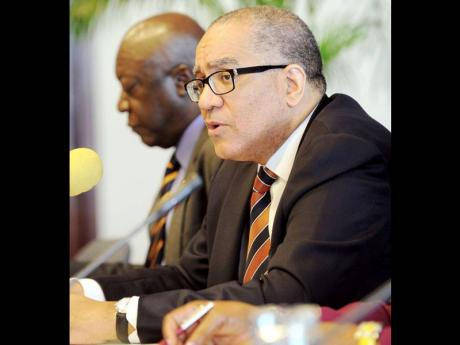Wynter banking on 'steadfast' adherence to new economic programme
Sabrina Gordon, Business Reporter
While acknowledging that there are still challenges ahead, central bank governor, Brian Wynter, defended the Government's medium-term economic programme, saying its steadfast implementation can lead to a rebuilding of the net international reserves and a return of investor confidence.
Wynter is a central member of the team that negotiated a new US$750m bailout agreement with the International Monetary Fund (IMF).
A previous agreement with the IMF was derailed at the end of 2010 after the Government backslid on the spending programme.
"The Government has committed to a process of extensive structural reforms which should lead to increased efficiency in the use of public resources, the strengthening and stabilisation of the macroeconomic framework, higher levels of productivity in the economy and marked improvements in the country's external competitiveness," said Wynter at the Bank of Jamaica's quarterly press briefing at its Nethersole Place headquarters on Monday.
"With steadfast implementation of these measures, we will also see a gradual rebuilding of net international reserves as the return of investor confidence should be accompanied by increased private and official inflows."
It will also enhance the central bank's ability to maintain single-digit inflation, he said. The central bank on Monday cut its policy rate by 50 basis points to 5.75 per cent; the last adjustment was in September 2011.
The new rate was announced immediately at the settlement of transactions under the J$860b National Debt Exchange - precondition of the IMF programme - which had 97 per cent take-up in its first round. The offer was extended to February 28.
"With the success of the NDX and interest rate structural changes we are now in a position where short term rate can be lower," said Wynter.
"The environment is conductive to it and now it is likely to have the most effect," he said.
Among the BOJ's most pressing problems is the foreign exchange rate, which is now headed to J$97 per USD.
The central bank said it sold US$54.5 million to the market during the October-December quarter.
That contributed to a decline of US$131.7 million in the NIR for the quarter to US$1.13 billion.
Since then the reserves have fallen even further and was barely holding above US$1 billion at the end of January.
Average depreciation
For the review quarter the local currency depreciated by approximately 3.3 per cent, following a decline of 1.4 per cent for the September quarter and an average depreciation of 2.1 per cent for the preceding five December quarters.
Still, the BOJ governor said the country had adequate resources to cover 13.2 weeks of goods and services imports, amounting to gross reserves of US$1.98 at the end of the December 2012. The international benchmark is 12 weeks.
Effective Monday, the bank also lowered its policy rate from 6.25 per cent to 5.75 per cent, a decision aimed at also supporting a recovery in the economy.
Despite this optimistic view though, the governor said the Bank expects the economy to show marginal growth in the range of zero and one per cent.
Given that forecast, he said real GDP growth for the fiscal year is projected in the range of negative 0.5 per cent and 0.5 per cent if the global economy continues to see a recovery and favourable weather conditions exist.
However, the central bank governor had a positive outlook for inflation targets, which he says is projected to fall in the range of two per cent and three per cent for the March quarter.
That forecast, he said, is largely due to expected moderating impact from the persistently weak domestic demand and the tight fiscal stance of the government.
The IMF agreement for a two-year Extended Fund Facility is due for final review and sign-off by the IMF board by the end of March.

